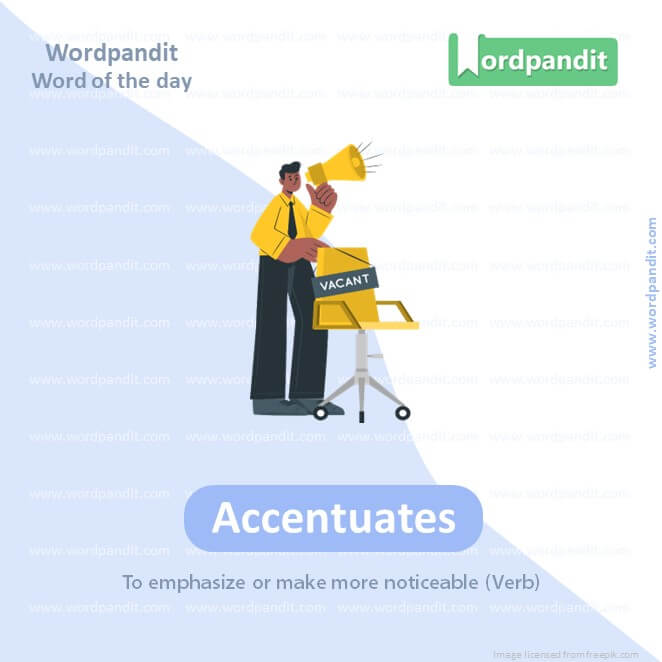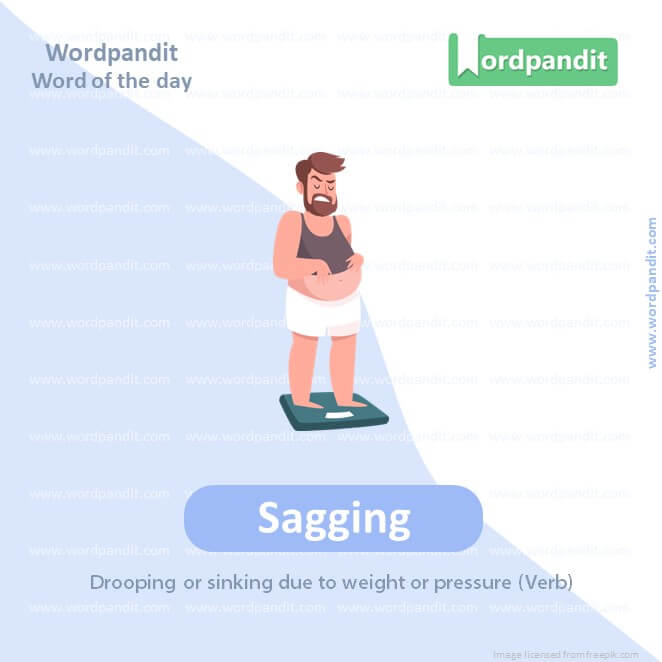Daily Vocabulary Words: List of Daily Used Words
Hi there. Welcome to this special section @ Wordpandit.
Our endeavour here is straightforward: highlighting important daily vocabulary words, you would encounter in The Hindu. This is your repository of commonly used words; essentially, we are posting a list of daily used words. Hence, this has significant practical application as it teaches you words that are commonly used in a leading publication such as The Hindu.
Visit the website daily to learn words from The Hindu.

WORD-1: Accentuates
CONTEXT: What accentuates this is also the lack of ideological clarity on the part of Congress leaders, barring a handful, to take on the politics of Hindutva head on.
SOURCE: The Hindu
EXPLANATORY PARAGRAPH: Imagine if you used a bright color to highlight something important in a picture or a drawing, making it stand out more. That’s what “accentuates” means—it’s when something is made more noticeable or prominent, often to emphasize its importance.
MEANING: To emphasize or make more noticeable (Verb).
PRONUNCIATION: ak-SEN-choo-eyts
SYNONYMS: emphasizes, highlights, underscores, brings out
USAGE EXAMPLES:
1. Her smile accentuates her natural beauty.
2. The lighting accentuates the architecture of the building.
3. The music accentuates the mood of the scene in the movie.
4. Using bold font accentuates the key points in the text.

WORD-2: Enhancing
CONTEXT: The Gender Equality section says, “We encourage women-led development and remain committed to enhancing women’s full, equal, effective, and meaningful participation.”
SOURCE: The Hindu
EXPLANATORY PARAGRAPH: Imagine if you added extra ingredients to your favorite dish to make it taste even better. That’s what “enhancing” means—it’s when something is improved or made better, often by adding or increasing positive qualities.
MEANING: To improve or augment, especially in effectiveness, value, or
attractiveness (Verb).
PRONUNCIATION: en-HANS-ing
SYNONYMS: improving, boosting, enriching, elevating, upgrading
USAGE EXAMPLES:
1. The new software update enhances the user experience.
2. Adding spices enhances the flavor of the dish.
3. Education plays a vital role in enhancing opportunities.
4. Regular exercise enhances overall health and well-being.

WORD-3: Privatised
CONTEXT: The ‘no governance is good governance’ model has removed government regulation, dismantled and sold off public assets, and privatised strategic industries.
SOURCE: The Hindu
EXPLANATORY PARAGRAPH: Imagine if a public place like a park or a library was taken over by a private company and operated for profit. That’s what “privatised” means—it’s when something that was publicly owned or controlled becomes owned or controlled by a private entity.
MEANING: Transferred from public or government control to private enterprise
(Verb).
PRONUNCIATION: PRAHY-vuh-tahyzd
SYNONYMS: transferred to private ownership, commercialized, corporatized, deregulated, outsourced
USAGE EXAMPLES:
1. The government privatised several state-owned enterprises.
2. The privatised utility company faced criticism for its pricing policies.
3. Privatisation of healthcare services led to changes in accessibility.
4. The decision to privatise public transportation sparked debates.

WORD-4: Prerequisite
CONTEXT: A critical area recognised as being a prerequisite for women’s development is her economic independence.
SOURCE: The Hindu
EXPLANATORY PARAGRAPH: Imagine if you wanted to play a game but needed certain items like a ball or a deck of cards to start. Those necessary items are called “prerequisites,” meaning they are required before something else can happen or be done.
MEANING: Required as a condition for something else to happen; a thing that is
required as a prior condition (noun).
PRONUNCIATION: pree-REK-wuh-zit
SYNONYMS: requirement, condition, essential, necessity, qualification
USAGE EXAMPLES:
1. Meeting the prerequisite qualifications is necessary for admission.
2. Having a valid passport is a prerequisite for international travel.
3. Financial stability is often a prerequisite for obtaining a loan.
4. Completing the basic training course is a prerequisite for advanced courses.

WORD-5: Sagging
CONTEXT: Ukraine’s Zelensky, conscious of the sagging support for Ukraine in Europe and elsewhere, could well attempt ‘a last throw of the dice’ and resort to desperate measures.
SOURCE: The Hindu
EXPLANATORY PARAGRAPH: Imagine if you saw a balloon losing air and starting to droop down instead of staying inflated and round. That drooping or sinking down is called “sagging,” and it can happen to things like clothes, cushions, or even the skin.
MEANING: Drooping or sinking due to weight or pressure (Verb).
PRONUNCIATION: SAG-ing
SYNONYMS: drooping, sinking, slumping, hanging, wilting
USAGE EXAMPLES:
1. The sagging roof needed repairs to prevent leaks.
2. Her shoulders slumped, and her posture looked sagging.
3. The old mattress had a noticeable sagging in the middle.
4. The plants wilted, leading to a sagging appearance in the garden.
WORD-6: Dispensation
CONTEXT: The general election is scheduled for mid-2024, and the ruling dispensation is displaying reasonable confidence about the outcome, greatly buoyed by its recent election victories in Madhya Pradesh, Rajasthan and Chhattisgarh.
SOURCE: The Hindu
EXPLANATORY PARAGRAPH: Imagine if you were given special permission or exemption from following a rule or regulation because of unique circumstances. That special permission or exemption is called a “dispensation,” meaning it’s an exception granted under specific conditions.
MEANING: The act of giving out or providing something, especially exemptions or special permissions (noun).
PRONUNCIATION: dis-puh-NSEY-shuhn
SYNONYMS: distribution, allocation, exemption, permission, allowance
USAGE EXAMPLES:
1. The dispensation of scholarships helped many students afford education.
2. Religious leaders sometimes grant dispensation from certain customs.
3. The dispensation of justice should be fair and impartial.
4. Dispensation of medications requires careful monitoring and documentation.
WORD-7: Preclude
CONTEXT: This does not, however, preclude the existence of some ‘black swans’, which may need to be attended to, specially as far as the economy is concerned.
SOURCE: The Hindu
EXPLANATORY PARAGRAPH: Imagine if you locked a door to prevent anyone from entering a room. That action of preventing something from happening is called “preclude,” meaning to make something impossible or prevent it from happening.
MEANING: Prevents something from happening or makes it impossible (verb).
PRONUNCIATION: pri-KLOOD
SYNONYMS: prevent, prohibit, hinder, stop, block
USAGE EXAMPLES:
1. His busy schedule precludes him from taking on additional tasks.
2. Weather conditions precluded outdoor activities.
3. The security measures precluded unauthorized access to the building.
4. Lack of funding precludes the project from moving forward.
WORD-8: Stalemated
CONTEXT: Sino-Indian relations will remain stalemated during much of 2024, with neither side displaying any accommodation of each other’s view point.
SOURCE: The Hindu
EXPLANATORY PARAGRAPH: Imagine if two teams playing a game were stuck at the same score for a long time, unable to make progress. That situation of being stuck with no progress is called “stalemated,” often used in situations where neither side can gain an advantage or win.
MEANING: In a situation where neither side can make progress or gain an advantage; deadlocked (adjective, past tense of “stalemate”).
PRONUNCIATION: STEYL-mey-tid
SYNONYMS: deadlocked, at an impasse, gridlocked, halted, stuck
USAGE EXAMPLES:
1. The negotiations between the two parties were stalemated for months.
2. The game was stalemated with both teams unable to score.
3. The project was stalemated due to disagreements over funding.
4. The political debate remained stalemated without reaching a consensus.
WORD-9: Impediment
CONTEXT: India is already a part of the U.S.-dominated anti-China alliance (however misplaced this perception might be), which is acting as a major impediment to any improvement in relations.
SOURCE: The Hindu
EXPLANATORY PARAGRAPH: Imagine if you were trying to run but had something in your way that slowed you down, like a big puddle or a heavy backpack. That thing which makes it hard to move forward or do something easily is called an “impediment,” like a roadblock or obstacle.
MEANING: Something that hinders or obstructs progress or movement; a barrier or obstacle (noun).
PRONUNCIATION: im-PED-uh-muhnt
SYNONYMS: obstacle, hindrance, barrier, obstruction, hurdle
USAGE EXAMPLES:
1. Lack of funding was the main impediment to completing the project.
2. Language barriers can be an impediment to effective communication.
3. Overcoming personal doubts was the biggest impediment to his success.
4. The new policy removed several impediments to business growth.
WORD-10: Diminution
CONTEXT: the West harps on this fact as an index of diminution of China’s influence across the region and beyond, there is a slender possibility of China embarking upon some ‘adventurist actions’ in the Sino-Indian border regions.
SOURCE: The Hindu
EXPLANATORY PARAGRAPH: Imagine if you had a big bowl of ice cream, and each scoop made the ice cream smaller and smaller until it was all gone. That decrease or reduction in size or amount is called “diminution,” like when something gets smaller or lessened.
MEANING: The act or process of reducing or making something smaller in size, amount, or importance (noun).
PRONUNCIATION: dih-muh-NOO-shuhn
SYNONYMS: reduction, decrease, decline, shrinkage, depletion
USAGE EXAMPLES:
1. The diminution of resources affected the company’s productivity.
2. There was a noticeable diminution in the number of attendees at the event.
3. The new policy led to a diminution in customer complaints.
4. Economic downturns often result in a diminution of household income.
Vocabulary Grammar
The journey of language mastery is a thrilling blend of words and structure, often referred to as ‘vocabulary grammar’. These critical components of any language work hand in hand to facilitate meaningful communication. However, embracing ‘vocabulary grammar’ requires a nuanced understanding and a strategic learning approach.
The initial step towards understanding ‘vocabulary grammar’ is to study the functionality of words in a sentence. Grammar holds the key to how vocabulary is structured in language. Therefore, observe how words change or influence meaning when placed differently in a sentence.
Leveraging diverse resources is a great way to grasp ‘vocabulary grammar’. Engage with a range of reading materials, audio-visual resources, and interactive language apps. This offers genuine exposure to ‘vocabulary grammar’ in real-world contexts and enhances comprehensive learning.
While learning ‘vocabulary grammar’, it’s important to see vocabulary and grammar as interconnected. Understanding how different parts of speech function can help in the effective usage of vocabulary. Try creating your own sentences using new vocabulary following certain grammatical rules to reinforce learning.
Revision holds its due significance in mastering ‘vocabulary grammar’. Regular review of learnt grammar rules and vocabulary ensures long-term retention and bolsters understanding. Use techniques like spaced repetition to make your review sessions more effective.
Lastly, practicing ‘vocabulary grammar’ is key to cementing your knowledge. Whether it is through writing exercises or conversing in the language, practicing allows you to apply ‘vocabulary grammar’ in a practical context and aids in accurate language use.
In conclusion, understanding ‘vocabulary grammar’ calls for conscious observation, diversified resources, interconnected learning, regular revision, and relentless practice. As you navigate this path, you will see ‘vocabulary grammar’ like two sides of the same coin, both essential to the value it holds in the wealth of language learning.










